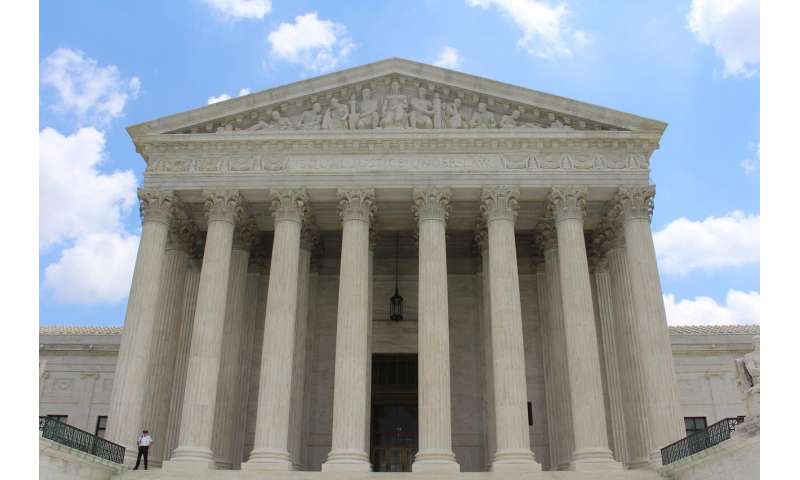
Facebook Inc. and Google were drawn into an escalating battle of wills Wednesday over the use of political advertising on social media.
Trump campaign officials pressured Facebook to maintain its permissive political advertising rules, while Alphabet Inc."s Google announced an overhaul of how campaigns may target their messages across the world's largest search engine.
The ability of candidates to show different messages to people based on their physical location, age or other characteristic, referred to as micro-targeting, has become an increasing focus of the broader debate about political advertising online. Last month, Twitter Inc. said it will ban political ads on its platform altogether, and is restricting targeting for other ads related to some politically charged issues, like climate change.
Google on Wednesday said it will ban candidates from targeting election ads based on people's political affiliation, though the messages can be tailored based on gender, age and geography. The company also is eliminating a feature called Customer Match, which allowed advertisers to upload their own lists of email addresses or phone numbers, and target ads specifically at those people.
Facebook, the largest platform for online political advertising, has been under pressure to follow suit. Several prominent Democrats have attacked the company for refusing to fact-check political ads. Facebook has rebuffed those calls, saying it doesn't want to police political speech. In October, hundreds of Facebook employees sent a letter to the company's executives calling for new limits on ad targeting for political campaigns. The letter became public after it was obtained by The New York Times.
Carolyn Everson, a Facebook vice president, said Monday at a Recode conference that the social media company wasn't considering changes to its targeted advertising options for political ads. Later that day, however, she told Axios, the news website, that Facebook hadn't ruled out any specific changes, raising the prospect the company may change course and limit targeting in some way.
The Trump campaign reacted directly to Everson's comments. It sees Facebook as an essential tool for speaking directly to voters, instead of relying on critical media outlets that the president says treat him unfairly.
Gary Coby, the Trump campaign's digital director, argued on Twitter Wednesday that stopping campaigns from pairing in-house data with Facebook's advertising tools would suppress voter engagement. "This would unevenly hurt the little guy, smaller voices, & issues the public is not aware of OR news is NOT covering," Coby tweeted, saying it was very "dangerous" and a "huge blow to speech."
Tim Cameron, chief executive officer at FlexPoint Media, a Republican media strategy firm, said the Trump campaign is likely concerned that new restrictions could result in Facebook deciding to begin fact-checking political ads. "I think the Trump campaign is looking down the road beyond this decision and are actually more afraid of subsequent decisions that Facebook may make," he said.
Facebook hasn't announced any changes to its policies. "For over a year, we've provided unprecedented transparency into all U.S. federal and state campaigns—and we prohibit voter suppression in all ads," a company spokesman said. "As we've said, we are looking at different ways we might refine our approach to political ads."
During the 2016 election, the Trump campaign ran 5.9 million different versions of ads, constantly testing them against different groups to increase engagement, according to internal Facebook documents reviewed by Bloomberg in 2018. It spent $44 million on Facebook in the six months before the 2016 election. So far in 2019, the Trump campaign has spent more than $15 million in ads, and is the largest political spender on the platform, according to Facebook's political ad library.
Before Google announced its changes, the company touted its ability to target voters based on political affiliations, like "right-leaning," as a major selling point. "They were all heartily selling us this for years as the coolest thing since sliced bread," said Will Ritter, the founder of Poolhouse, a political advertising firm.
Google's new restrictions mean campaigns may have to spend more after losing the ability to hit key voters, Ritter added. For instance, a candidate could identify frequent Republican voters in Democratic-heavy areas of the country, and reach them with ads on search and YouTube. Now they can't.
"It's just going to increase costs because there's going to be so much waste," Ritter said.
Irene Knapp, a former Google employee who now works for Tech Inquiry, a political advocacy group focused on ethical issues related to technology, said the ability to target makes online advertising particularly susceptible to abuse. Campaigns can test messages on certain audiences, find which ones resonate, then use tools provided by Facebook or Google to target those people with new ads while also reaching people with similar characteristics. Misleading messaging can be directed at specific audiences without drawing widespread attention.
"You can be seeing one message that seems fine, and your next-door neighbor can be seeing some misinformation that is cleverly targeted to produce a very different response or action," Knapp said.
Knapp said Google's Customer Match tool could be used to target racial groups, or engage in other behavior that violates the policies of the platforms. The equivalent tool on Facebook, "Custom Audiences," still exists.
©2019 Bloomberg News
Distributed by Tribune Content Agency, LLC.
Citation: Google, Facebook at center of escalating political-ad tension (2019, November 21) retrieved 21 November 2019 from https://techxplore.com/news/2019-11-google-facebook-center-escalating-political-ad.html
This document is subject to copyright. Apart from any fair dealing for the purpose of private study or research, no part may be reproduced without the written permission. The content is provided for information purposes only.
